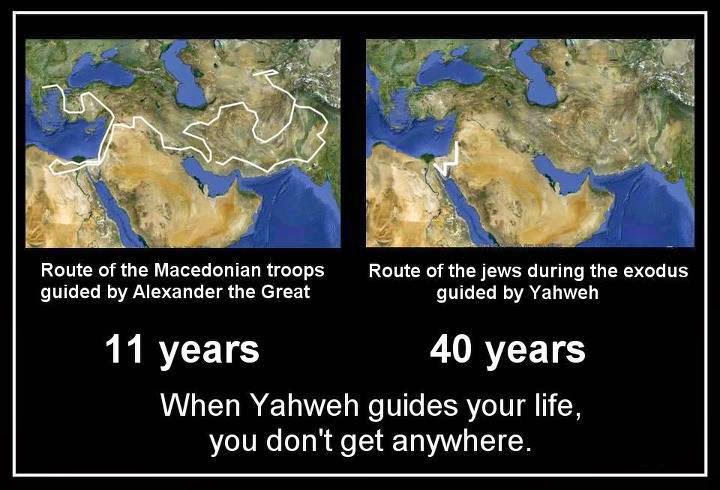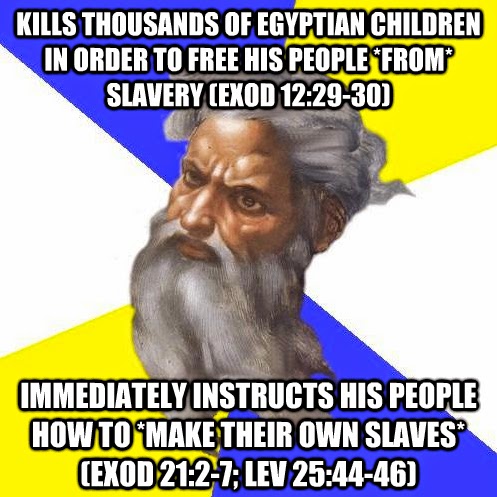“Ye Shall Be a Peculiar Treasure unto Me”
Exodus 15–20; 32–34
LDS manual: here
Reading
After picking our way carefully through Genesis in great detail, we’re now blasting through 25 chapters of Exodus in one lesson. Wow, CES, what’s the rush? Do you have to catch a train? Is it because it’s so boring, or is there a lot of weird stuff? Actually, it’s both. Here are the highlights.
Ch. 15: Moses is so pleased that Jehovah killed so many Egyptians that he breaks into song.
15:3 The LORD is a man of war: the LORD is his name.
15:4 Pharaoh’s chariots and his host hath he cast into the sea: his chosen captains also are drowned in the Red sea.
Ch. 16: But it’s not all music theatre; the people need food and water. God gives them manna, which is now used to measure health in League of Legends.
Ch. 17: God decides he really hates the Amalakites, and will try to kill them, no matter what. But on this particular day, he’s only going to help the Israelites kill them if Moses hold his arms over his head. When Moses gets tired, Aaron and Hur hold his arms up, so Jehovah gives it to him on a technicality.
Ch. 18: There’s actually quite a good lesson here about delegation.
Chs. 19–20: God’s going to appear up on Mount Sinai, so Moses tells all the people to wash their clothes and stop having sex. God gives Ten Commandments, and instructions for building altars. No hewn stones — he’s very fussy about his altars!
Chs. 21–23: These chapters are taken with a discussion of rules the Israelites were to live by. Discussed in detail below.
Ch. 24: Moses heads up the mountain for forty days and forty nights for a look at God. What great insight does God give Moses for humanity?
Chs. 25–31: How to make furniture! Specifically the Ark of the Covenant, a piece of furniture especially for Jehovah. Also, how to sacrifice animals in just the way God likes. No, seriously, there are seven chapters of this.
Ch. 32: Upon coming down from the mountain, Moses finds that the Israelites have made a golden calf to worship. Result: Moses and the Levites kill three thousand men, right after Jehovah tells them not to kill.
Ch. 33: God thinks all this killing is really cool, so as a special treat, he shows Moses his ‘back parts’.
33:20 And he said, Thou canst not see my face: for there shall no man see me, and live.
33:21 And the LORD said, Behold, there is a place by me, and thou shalt stand upon a rock:
33:22 And it shall come to pass, while my glory passeth by, that I will put thee in a clift of the rock, and will cover thee with my hand while I pass by:
33:23 And I will take away mine hand, and thou shalt see my back parts: but my face shall not be seen.
Yes, apparently God moons Moses.
Ch. 34: Oh, look, the Ten Commandments again, for real this time.
Ch. 35: Also, kill anyone who works on the Sabbath. That includes lighting fires.
Chs. 36–40: We saw the design for the Ark being described in boring detail. Now it’s being built in boring detail.
Main points from this lesson
No evidence for Israel in the wilderness
This is kind of a reiteration from last time, but it’s worth repeating: There’s no evidence that the Israelites wandered around for forty years in that area.
Could it be that they did such a great job cleaning up? Yes, if Mr Deity is to be believed.
And it’s worth pointing out that if 40 years in the wilderness is what you get from following your god, you’d be better off asking for directions.
Slavery is okay in the OT
These chapters contain rules about how the nascent group of Israelites were to conduct themselves. Along the way, God signs off on slavery.
What sort of instruction do we get from the Bible on slavery? Sam Harris explains.
Here are the highlights:
- It’s okay to sell your daughter into slavery
21:7 And if a man sell his daughter to be a maidservant, she shall not go out as the menservants do.
God doesn’t say “Don’t have slaves”; he instead gives the conditions under which it’s okay to own people. Wouldn’t it have been simple for God to outlaw it? Three words: “Don’t have slaves.”
Penn and Teller have their take on this:
- It’s not okay to beat a slave to death. On the other hand, if he dies a few days later, that’s okay because, hey, he is your money after all.
21:20 And if a man smite his servant, or his maid, with a rod, and he die under his hand; he shall be surely punished.
21:21 Notwithstanding, if he continue a day or two, he shall not be punished: for he is his money.
You’d think Jehovah wouldn’t be okay with slavery because the Israelites were slaves, but no.
Other interesting or odd things in Exodus
- A foetus is not the same as a person.
21:22 If men strive, and hurt a woman with child, so that her fruit depart from her, and yet no mischief follow: he shall be surely punished, according as the woman’s husband will lay upon him; and he shall pay as the judges determine.
In other words, if you cause a pregnant woman to lose her child, the penalty is a fine, not the same as if you’d killed someone. So it seems that God isn’t terribly pro-life, but we already knew that from the last lesson.
- You have to stone your disobedient children.
21:17 And he that curseth his father, or his mother, shall surely be put to death.
- It’s okay to kill a thief, and if he can’t pay back what he stole, you can sell him.
22:2 If a thief be found breaking up, and be smitten that he die, there shall no blood be shed for him.
22:3 If the sun be risen upon him, there shall be blood shed for him; for he should make full restitution; if he have nothing, then he shall be sold for his theft.
- Kill witches.
22:18 Thou shalt not suffer a witch to live.
Wonder how many people have died over that one.
- No bestiality.
22:19 Whosoever lieth with a beast shall surely be put to death.
When I was a kid, bored in interminable Sacrament Meetings, I would leaf through the Bible. Imagine my surprise to find rules about having sex with animals.
- Don’t boil a baby goat in its mother’s milk.
23:19 …Thou shalt not seethe a kid in his mother’s milk.
Apparently this was a fertility practice. God didn’t like competing fictions, so he put a stop to that. Instead, you’re supposed to kill the animal and wave the meat around a bit.
This scripture is used as a justification for the Jewish practice of not eating dairy and meat in the same meal, which seems like a bit of a stretch. I can imagine how this conversation went down between Moses and God.
God: Moses, I don’t want you to boil a baby goat in its mother’s milk.
Moses: You got it, God. We won’t have dairy and meat at the same meal.
God: Wha — ? No, I don’t think you’ve understood. I just want you not to boil a baby goat in its mother’s milk.
Moses: No problem! We’ll wait six hours before we switch to meat.
God: Hang on, Moses. Listen. Don’t boil…
Moses: In fact, we’ll have different plates! Separate kitchens!
God: FML.
- Don’t allow other people to have religious freedom.
23:24 Thou shalt not bow down to their gods, nor serve them, nor do after their works: but thou shalt utterly overthrow them, and quite break down their images.
When I point out the absurdities or injustices in Exodus, believers say something like, “Well, some of those things are a bit strange. But remember that it was probably better than what the other people in that area were doing. These rules represented an advance in morality.” To which I would cheerfully agree. In fact, the rules in every new religion through the ages probably represented an advance in morality over what was available at the time. How could it not? Humans have become more moral over time, so each new iteration of rules had the chance to contain some moral innovations (as well as a lot of horrible new things and irrelevant crap).
When I see the rules in Exodus, I don’t see a god dispensing rules. I see people trying to work out how to make a stable and fair society within their social and political scene. And, you know, some weirdness.
The problem with religious morality is that is gets stuck. Saying “God wants you to do X” may be a good way to get people to believe you, but then it’s hard to get them to update. It’s like some religious groups that still dress in the kind of suits that were popular when their group got started. Fine at the time, but now they’re stuck. A humanistic approach would be better: recognise that we make and teach each other a socially evolved morality that isn’t absolute, and that can change and improve.
Church leaders are, unsurprisingly, as oblivious to society’s moral improvement as they are to the immorality of their hopelessly stuck moral system. They’ve got it so upside-down that better looks worse to them.
The Ten Commandments are not really a great guide for living.
Do you know the Ten Commandments? (Many religious people don’t, as illustrated by this great Stephen Colbert clip.)
Here they are, at least the version in chapter 20.
20:3 Thou shalt have no other gods before me.
20:4 Thou shalt not make unto thee any graven image….
20:7 Thou shalt not take the name of the LORD thy God in vain….
20:8 Remember the sabbath day, to keep it holy.
20:12 Honour thy father and thy mother….
20:13 Thou shalt not kill.
20:14 Thou shalt not commit adultery.
20:15 Thou shalt not steal.
20:16 Thou shalt not bear false witness against thy neighbour.
20:17 Thou shalt not covet thy neighbour’s house, thou shalt not covet thy neighbour’s wife, nor his manservant, nor his maidservant, nor his ox, nor his ass, nor any thing that is thy neighbour’s.
The first four have nothing to do with how we treat each other, and everything to do with Jehovah protecting his brand. The others are pretty good, except for the distressing tendency to treat people like property; again, not the work of a transcendent being.
George Carlin had a great take on breaking them down to two.
Really, anyone could do a better job of coming up with ten rules for living. How about:
Don’t persecute people who are different than you.
Women are equal to men.
Don’t destroy living things for no good reason.
Think about what you’re leaving for the next generation.
Got any others? Leave them in comments.
Additional suggestions for teaching
Attribution to god
When the people complain, Moses says that they’re not complaining against him, they’re complaining against god. Oh, nice one, Moses. Way to hide behind your delusion.
This is a tactic known as religious attribution, and it’s a fairly common tactic employed by religious people. If they say something ignorant, illogical, or benighted, they claim that they’re just reporting god’s true opinion (which just happens to align with theirs), and who are you to question god? They’re not to blame. Here’s Jesus using it.
God is jealous
34:14 For thou shalt worship no other god: for the LORD, whose name is Jealous, is a jealous God:
Did Moses have horns?
When Moses comes down from the mountain, Exodus says:
34:35 And the children of Israel saw the face of Moses, that the skin of Moses’ face shone
But in the Vulgate, Jerome translated this as
“And when Moses came down from the mount Sinai, he held the two tables of the testimony, and he knew not that his face was horned from the conversation of the Lord.”
An odd word choice. Perhaps horned as in ‘sending out rays of light like horns’. Anyway, horns it was, and accordingly, Michelangelo made his statue of Moses with a couple of big honkers.
Toot, toot. Until next week.









13 April 2014 at 4:16 pm
Daniel,
Thanks^14
My highlights.
1. "The problem with religious morality is that is gets stuck.”
Indeed, with only intermittent institution-preserving myopic capitulations when it falls too far behind the Moral Zeitgeist and loses members.
Mormonism appears a caricature of this owing to its compressed well-documented history and how it displays in such sharp relief features responsible for this “stuckedness. “ For instance blatantly fake scriptural history and ongoing revelatory access to deity.
2. Mira Sorvino quotation.
3. I miss George Carlin. I wish I could have really “got” what he was about when I was a kid.
4. Commandment update.
Thou shalt not pretend to know things you don’t.
Thou shalt not presume you are not pretending – your brain isn’t good at telling the difference.
14 April 2014 at 3:38 am
I agree with your commandments, Daniel, and Eric's two. If we're imagining what would have been best to help people from way back when Hebrew people were first writing this story down, there of course should be a health tip as well: Thou shalt not eat before thou hast washed thine hands. Going back to more general: Thou shalt try to have joy all thy days, and help others to feel joy as well. Something like that.
14 April 2014 at 4:20 am
I like all these ideas. Although to be fair, they did have some pretty strict rules about hand-washing (Lev 15:11). I guess for them, though, it became about the ritual and not about getting your hands clean.
Which reminds me of something Sam Harris' said: Religion gives us bad reasons to do good, when good reasons are available.